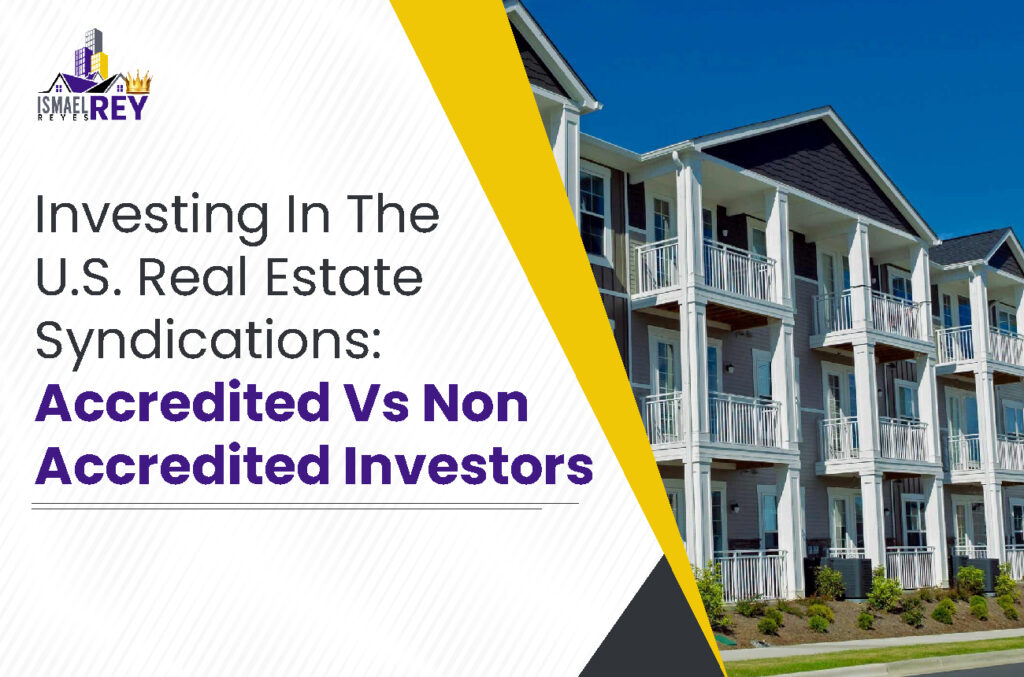Investing in the U.S. Real Estate Syndications: Accredited vs. Non-Accredited Investors

Introduction:
Investing in the U.S. real estate market can be a lucrative endeavor. Still, it’s essential to understand the distinctions between accredited and non-accredited investors when participating in real estate syndications. In this comprehensive guide, we’ll delve into the intricacies of these two investor types, shedding light on their respective advantages, requirements, and opportunities.
Accredited vs. Non-Accredited Investors: An Overview
Investing in U.S. real estate syndications involves pooling resources with other investors to collectively purchase and manage real estate properties. Accredited and non-accredited investors are two categories of participants with differing criteria and roles within these ventures.
What Is an Accredited Investor?
Accredited investors are individuals or entities that meet specific financial criteria set by the U.S. Securities and Exchange Commission (SEC). To qualify as an accredited investor, one must have an annual income of at least $200,000 (or $300,000 for joint income with a spouse) for the past two years, with the expectation of similar income in the current year. Alternatively, an individual can qualify with a net worth exceeding $1 million, either individually or jointly with their spouse, excluding the value of their primary residence.
Accredited investors enjoy certain privileges, such as access to a broader range of investment opportunities and reduced regulatory oversight.
Non-Accredited Investors: Who Are They?
On the other hand, non-accredited investors do not meet the stringent financial criteria outlined by the SEC for accredited investors. These investors typically have lower income levels and net worth. However, they still play a crucial role in real estate syndications and can participate in various ways.
Opportunities for Accredited Investors
Accredited investors have access to various investment opportunities within U.S. real estate syndications. Here are some advantages they enjoy:
Diverse Investment Choices
Accredited investors can explore diverse real estate projects, including commercial properties, residential developments, etc. This diversity allows them to tailor their investments to their preferences and risk tolerance.
Potential for Higher Returns
With a broader range of investment choices, accredited investors can seek higher returns on their investments. They can participate in projects with the potential for substantial profits.
Reduced Regulatory Restrictions
Accredited investors face fewer regulatory restrictions, which can streamline the investment process. They have the flexibility to invest more considerable sums without stringent oversight.
Opportunities for Non-Accredited Investors
Non-accredited investors may not have the same financial resources as their accredited counterparts, but they still have valuable opportunities in real estate syndications:
Crowdfunding Platforms
Non-accredited investors can participate in real estate crowdfunding platforms. These platforms allow individuals to invest smaller amounts in real estate projects, making them more accessible to a wider range of investors.
Joint Ventures
Non-accredited investors can partner with accredited investors in joint ventures. By pooling their resources, they can access more significant deals and benefit from the expertise of accredited investors.
Real Estate Investment Trusts (REITs)
Non-accredited investors can also consider investing in Real Estate Investment Trusts (REITs), which offer a diversified portfolio of real estate assets. REITs provide a convenient way for smaller investors to enter the real estate market.
Frequently Asked Questions
Can non-accredited investors become accredited over time?
Yes, individuals can work towards becoming accredited investors by increasing their income or net worth. It may take time and careful financial planning, but it is achievable.
What are the risks associated with real estate syndications?
Real estate investments carry inherent risks, including market fluctuations, property management challenges, and economic downturns. It’s essential to conduct thorough due diligence before investing.
Are there any tax benefits for real estate investors?
Yes, real estate investors, both accredited and non-accredited, can benefit from tax advantages such as depreciation deductions and potential capital gains tax savings.
How can I assess the credibility of a real estate syndication opportunity?
To assess the credibility of a real estate syndication, investors should review the sponsor’s track record, financial projections, and the terms of the investment. Consulting with a financial advisor is advisable.
Can non-accredited investors invest directly in properties?
Non-accredited investors can invest directly in real estate properties but may face financing challenges. Joining a real estate syndication or using crowdfunding platforms can be viable alternatives.
What are some strategies for mitigating risks in real estate syndications?
Diversification, thorough due diligence, and working with experienced sponsors effectively mitigate risks in real estate syndications.
Conclusion
Investing in U.S. real estate syndications offers opportunities for accredited and non-accredited investors. While accredited investors enjoy greater access to diverse projects and the potential for higher returns, non-accredited investors can still participate through crowdfunding, joint ventures, and REITs. Regardless of your investor status, conducting thorough research, assessing risks, and seeking expert advice to make informed investment decisions in the dynamic world of real estate syndications is crucial.
About ismaelreyreyes
Unlock the path to financial freedom with Passive Income Through Multifamily Real Estate Investment. Imagine earning money while you sleep, all thanks to wise investments in multifamily properties. This lucrative venture allows you to generate a steady stream of income without the hassle of active involvement, giving you the freedom to live life on your terms. With careful research, strategic property selection, and sound management, you can create a sustainable source of passive income, providing financial security and peace of mind. Embrace the opportunity to achieve your financial goals and build a prosperous future through the power of multifamily real estate investment.

